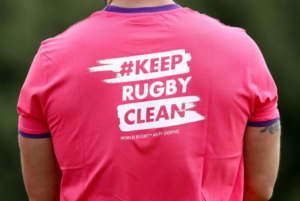World Rugby and AFLD, the French National Anti-Doping Organisation, have announced details of the anti-doping testing programme for Rugby World Cup 2023 in France, supporting a fair contest.
Rugby World Cup 2023 will be rugby’s greatest celebration of togetherness in the 200th anniversary of the sport, and AFLD will provide independent sample collection for the tournament as the official Sample Collection Agency.
Promoting a level playing field for all, World Rugby in collaboration with the France 2023 organising committee will implement a specific awareness campaign during the tournament on 23-24 September, 2023 during the “Keep Rugby Clean” weekend.
World Rugby collected over 2500 urine and blood samples in 2022 from over 60 nationalities and is well into its 2023 testing programme which focuses heavily on the 20 teams participating in the 2023 edition of RWC, all of whom have been included in a long-term pre-tournament testing and education programme since their qualification. The testing programme uses intelligence and biological passport data to focus on doping risk, and samples are stored to allow for reanalysis as science evolves.
World Rugby Chairman Sir Bill Beaumont said: “Rugby World Cup 2023 will be a great celebration of what rugby does best: bringing people together around an amazing spectacle on and off the pitch. In the sport’s 200th anniversary, we will remain true to our core values of passion and integrity and the collaboration with French experts AFLD will help us keep a level playing field for all participating teams.”
AFLD Testing Director Francesca Rossi said: “It is a pleasure and an honour for AFLD to offer its expertise and human resources to carry out World Rugby’s anti-doping programme in the best possible way. We are already collaborating with World Rugby colleagues on a regular basis, including on education aspects, and we are confident that everything will be handled perfectly to achieve our joint goals.”
World Rugby Anti-Doping Director Mike Earl said: “World Rugby is delighted to continue our longstanding close relationship with AFLD by appointing them as our sample collection agency for the tournament. AFLD have many years of experience in running anti-doping programmes in elite rugby in France and of operating major event testing programmes and we look forward to combining both organisations’ expertise to deliver a ‘best in class’ deterrent and detection programme during Rugby World Cup 2023; supporting our objectives of a clean competition for all participants.”

